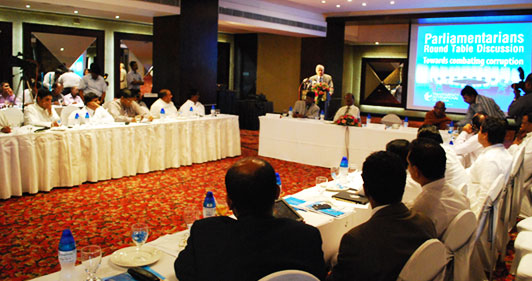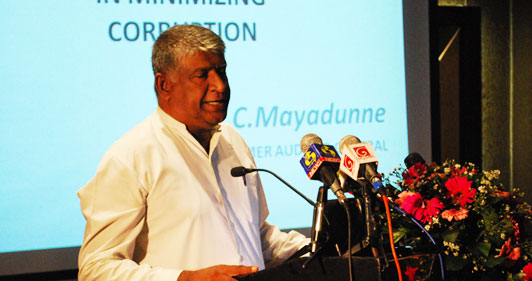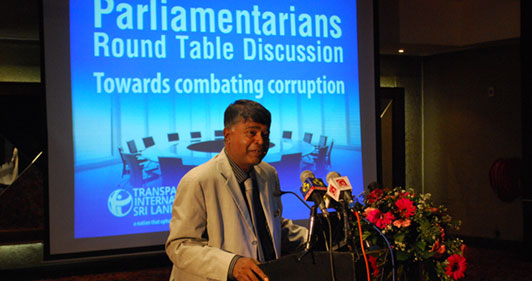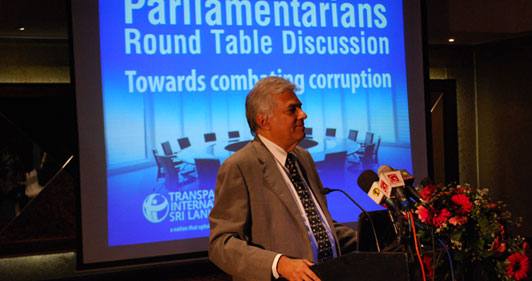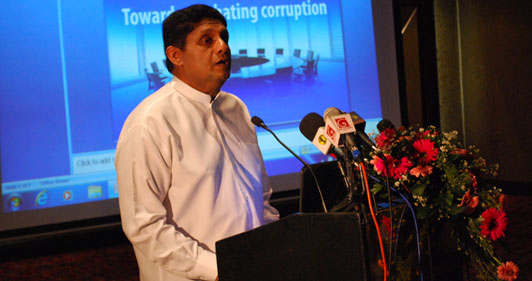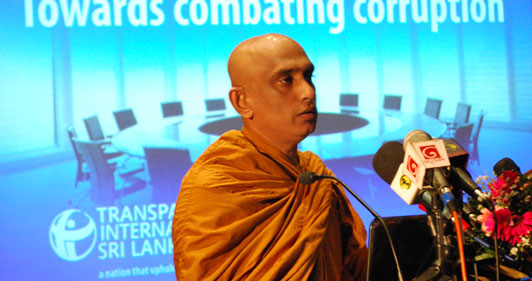Parliamentarians who responded to the invitation by Transparency International Sri Lanka (TISL) to discuss an action plan to combat corruption in Sri Lanka responded positively that it is a problem that needs to be addressed without delay.
Thirty MPs, mainly from the Opposition were present at the roundtable discussion held at Waters’ Edge on 6 June.
After the welcome address by TISL Executive Director, S Ranugge who presented facts and figures relating to Sri Lanka’s position quoting from global surveys on corruption, the MPs listened to a presentation by former Auditor General, S C Mayadunne on ‘Public finance in controlling corruption’.
Professor Rajiva Wijesinghe MP, leader of the Liberal Party – a constituent party of the Government, said that ideas about eliminating corruption had been presented by his party continuously and that he was pleased that some of them are being gradually accepted by the other parties. Stressing on the need for Parliament to play an active role in combating corruption, he pointed out that a revision of the Standing Orders was necessary. These should entrench anti-corruption provisions. He also highlighted the need to strengthen the parliamentary oversight committees like COPE and the Public Accounts Committee (PAC). While these committees have exposed instances of wastage and corruption, there hasn’t been any action so far.
He also dealt with the need to reduce the size of the Cabinet. It was impossible for Parliament to perform its oversight function in terms of public finance when a majority of parliamentarians wwre ministers or part of the Executive, he said.
The need to reform the electoral system was another suggestion by Professor Wijesinghe to curb corruption. Saying that the preferential system is destructive because it pitted politicians agaiust each other in financial competition, he suggested a mixed system.
Leader of the Opposition, Hon Ranil Wickremasinghe thanked TISL for arranging the roundtable discussion on corruption and expressed his disappointment in not seeing many faces of government MPs. Accepting that corruption is a vital issue, he said that the flow of foreign aid has led to mass scale corruption. Stating that corruption has overtaken people’s sovereignty and terming is as a threat, he pointed out that foreign loans have created an avenue for corruption. When these are obtained or when agreements are signed there is a need for machinery and equipment.
Saying that commissions can be received through foreign loans, he stated that earlier foreign aid were outright grants which came in the form of direct donations. Or else only a small amount was charged as interest.
He went on to explain that today foreign loans are obtained through the Export Import Bank at a higher interest which also includes a commission if the money is used for services. People have to repay these loans. With loans pile up, it affects education and health services which have to be curtailed. The country is thus moving in the same direction like Greece, Cyprus and Ireland. He discussed the fate of Argentina at length.
Referring to the proposed constitution by the United National party, he said that the new constitution should be approved by the people. There should be a legal revolution where there can be a change of regime.
Atureliye Ratna Thera representing the Jatika Hela Urumaya traced the origin of wastage and corruption to man’s craving resulting in the quest for power and competition. Lamenting that we have not been able to formulate our own system of planning, he said that we cannot go on the way we are doing at present. He stressed the need for a national policy on obtaining loans. There should be a model where the people can acquire power.
During the open forum several Parliamentarians expressed their views and made suggestions which can help combat corruption.
UNP parliamentarian Wijedasa Rajapaksha said that then Legislature has lost the powers it had after such powers were taken over by the Executive President. Although the number of Cabinet ministers should reduce hen the President has executive powers, today the Cabinet has 65 ministers. He said that corruption happens when the portfolios of Defence and Finance are under the Executive.
UNP parliamentarian Sajith Premadasa stated that the present electoral system had led to the candidates having to spend a lot of money thereby creating a situation where they have to look for big money.. He stressed the need for transparency in campaign funds to funding. He was critical of the tender procedure which he said was corrupt. He proposed an all party representation in the selection of tenders.
UPFA parliamentarian Manusha Nanyakkara said that although that the subject of corruption is talked about in Parliament, no details are revealed about corrupt activities. The government does not want corruption. Corruption should be exposed.
Democratic Party parliamentarian Jayantha Kelagoda called for a countrywide awareness campaign on corruption.
UNP parliamentarian Chandrani Bandara suggested a change in the electoral system as a means of curbing corruption.
Several ministers had written to say that they were unable to attend the discussion due to the Cabinet meeting which was being held that morning.

